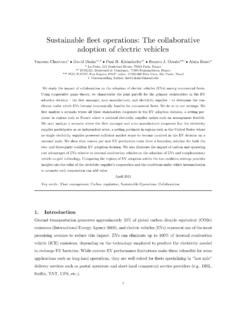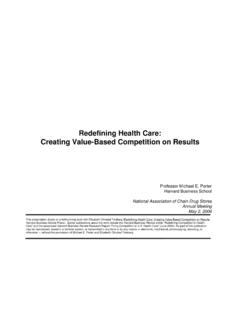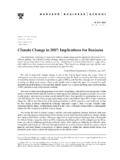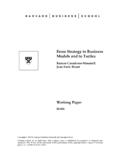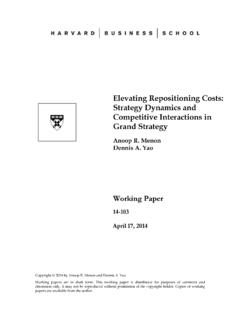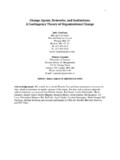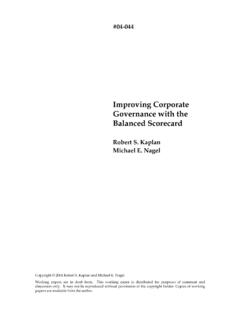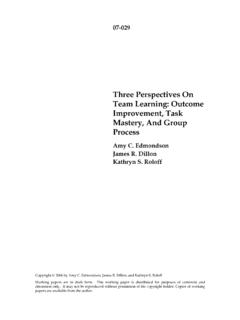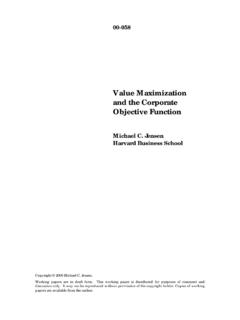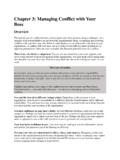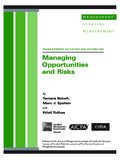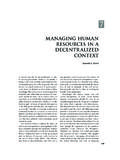Transcription of 09-028 performance persistence
1 performance persistence in Entrepreneurship Paul A. Gompers Anna Kovner Josh Lerner David S. Scharfstein Working Paper 09-028 . Copyright 2008 by Paul A. Gompers, Anna Kovner, Josh Lerner, and David S. Scharfstein Working papers are in draft form. This working paper is distributed for purposes of comment and discussion only. It may not be reproduced without permission of the copyright holder. Copies of working papers are available from the author. performance persistence in Entrepreneurship Paul Gompers, Anna Kovner, Josh Lerner, and David Scharfstein*. This Draft: July 2008. Abstract This paper presents evidence of performance persistence in entrepreneurship. We show that entrepreneurs with a track record of success are much more likely to succeed than first-time entrepreneurs and those who have previously failed.
2 In particular, they exhibit persistence in selecting the right industry and time to start new ventures. Entrepreneurs with demonstrated market timing skill are also more likely to outperform industry peers in their subsequent ventures. This is consistent with the view that if suppliers and customers perceive the entrepreneur to have market timing skill, and is therefore more likely to succeed, they will be more willing to commit resources to the firm. In this way, success breeds success and strengthens performance persistence . *. Harvard University. Gompers, Lerner, and Scharfstein are also affiliates of the National Bureau of Economic Research. An earlier version of this paper was called Skill vs. Luck in Entrepreneurship and Venture Capital: Evidence from Serial Entrepreneurs.
3 We thank Tim Dore and Henry Chen for exceptional research assistance on this project. Harvard Business School's Division of Research and the National Science Foundation provided financial assistance. Participants at various seminars and the Western Finance Association meetings, especially Morten Sorensen, provided helpful comments. All errors and omissions are our own. Corresponding author: David Scharfstein, Baker Library 239, Harvard Business School, Soldiers Field, Boston, MA 02163, 617-496- 5067, 1. Introduction In this paper, we address two basic questions: Is there performance persistence in entrepreneurship? And, if so, why? Our answer to the first question is yes: all else equal, a venture-capital-backed entrepreneur who succeeds in a venture (by our definition, starts a company that goes public) has a 30% chance of succeeding in his next venture.
4 By contrast, first-time entrepreneurs have only an 18% chance of succeeding and entrepreneurs who previously failed have a 20% chance of succeeding. The answer to the second question of why there is performance persistence is more complex. performance persistence for example, among mutual fund managers, stock analysts, or football players is usually taken as evidence of skill. This is certainly the most straightforward explanation of our finding. Indeed, we will provide additional evidence to support this view. However, in the context of entrepreneurship, there may be another force at work. The perception of performance persistence the belief that successful entrepreneurs are more skilled than unsuccessful ones can induce real performance persistence .
5 This would be the case if suppliers and customers are more likely to commit resources to firms that they perceive to be more likely to succeed based on the entrepreneur's track record. This perception of performance persistence mitigates the coordination problem in which suppliers and customers are unwilling to commit resources unless they know that others are doing so. In this way, success breeds success even if successful entrepreneurs were just lucky. And, success breeds even more success if entrepreneurs have some skill. To distinguish between the skill-based and perception-based explanations, it is important to identify the skills that might generate performance persistence . Thus, we decompose success into two factors.
6 The first factor, which we label market timing skill, is the component of success that comes from starting a company at an opportune time and place, , in an industry and year in which success rates for other entrepreneurs were high. For example, 52% of computer startups founded in 1983 eventually went public, while only 18% of computer companies founded in 1985 ultimately succeeded. The second factor is the component of success that is determined by the entrepreneur's management of the venture outperformance relative to other startups founded at the same time and in the same industry. We measure this as the difference between the actual success and the predicted success from industry and year selection. By these measures, an entrepreneur who ultimately succeeded with a computer company founded in 1985 exhibits poor market timing, but excellent managerial skill.
7 One who failed after founding a computer company in 1983 exhibits excellent market timing, but poor managerial skill. Is starting a company at the right time in the right industry a skill or is it luck? It appears to be a skill. We find that the industry-year success rate in the first venture is the best predictor of success in the subsequent venture. Entrepreneurs who succeeded by investing in a good industry and year ( , computers in 1983) are far more likely to succeed in their subsequent ventures than those who succeeded by doing better than other firms founded in the same industry and year ( , succeeding in computers in 1985). More importantly, entrepreneurs who invest in a good industry-year are more likely to invest in a good industry-year in their next ventures, even after controlling for differences in overall success rates across industries.
8 Thus, it appears that market timing ability is an attribute of entrepreneurs. We do not find evidence that previously successful 2. entrepreneurs are able to start companies in a good industry-year because they are wealthier. Entrepreneurs who exhibit market timing skill in their first ventures also appear to outperform their industry peers in their subsequent ventures. This could be explained by the correlation of market timing skill with managerial skill those who know when and where to invest could also be good at managing the ventures they start. However, we find that entrepreneurs who outperform their industry peers in their first venture are not more likely to choose good industry-years in which to invest in their later ventures.
9 Thus, it seems unlikely that there is a simple correlation between the two skills, though it is certainly possible that entrepreneurs with market timing skill have managerial skill, but not vice versa. Rather, this evidence provides support for the view that some component of performance persistence stems from success breeding success. In this view, entrepreneurs with a track record of success can more easily attract suppliers of capital, labor, goods and services if suppliers believe there is performance persistence . A knack for choosing the right industry-year in which to start a company generates additional subsequent excess performance if, as a result, the entrepreneur can line up higher quality resources for his next venture.
10 For example, high-quality engineers or scientists may be more interested in joining a company started by an entrepreneur who previously started a company in a good industry and year if they believe (justifiably given the evidence) that this track record increases the likelihood of success. Likewise, a potential customer of a new hardware or software firm concerned with the long-run viability of the start-up will be more willing to buy if the entrepreneur has a track record of choosing the right time 3. and place to start a company. Thus, market timing skill in one venture can generate excess performance (which looks like managerial skill) in the next. Note that this is not necessarily evidence of the extreme version of success breeding success in which the misperception that skill matters generates performance persistence .
